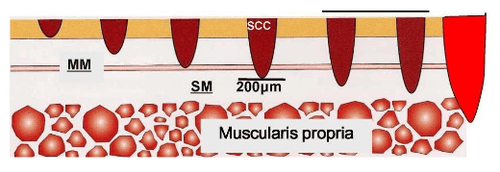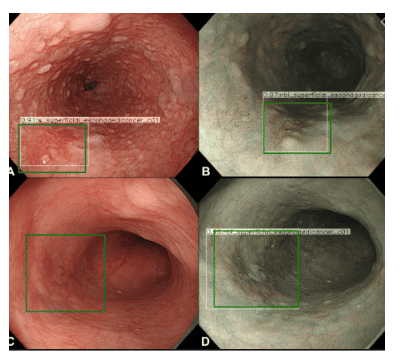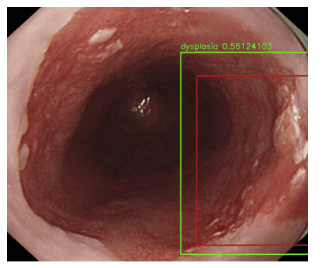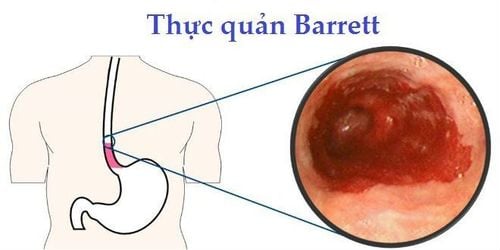This is an automatically translated article.
Post by Master, Doctor Mai Vien Phuong - Department of Examination & Internal Medicine - Vinmec Central Park International General HospitalUpper gastrointestinal endoscopy remains the gold standard for diagnosing esophageal cancer. The accuracy of endoscopy results largely depends on the expertise of the examiner. Artificial intelligence (AI) applied in early screening for esophageal cancer has shown advantages. Remarkably, it is more accurate than less experienced endoscopists. This paper evaluates the application of artificial intelligence in the field of endoscopic early detection of esophageal cancers, including squamous cell carcinoma and adenocarcinoma, and describes related advances.
1. Current situation of esophageal cancer
Esophageal cancer is one of the most common malignancies of the gastrointestinal tract and originates in the esophageal mucosal epithelium. In 2018, the global incidence of esophageal cancer ranked seventh among malignancies (6.3/100000), and the mortality rate sixth (5.5/100000). There are significant differences in incidence and patterns of esophageal cancer between different countries and regions, with the highest incidence in East Asia, more than twice the world average (12, 5). 2/100000). The major pathologic type is esophageal squamous cell carcinoma, while esophageal adenocarcinoma is the major pathologic type in regions with relatively low incidence such as Europe and the United States. The experience of Japan and Korea has confirmed that early esophageal cancer lesions can be cured by endoscopic therapy. The curative effect is equivalent to surgery, the patient's 5-year survival rate can reach 95%. Therefore, early detection of esophageal cancer and prompt endoscopic treatment are the only ways to reduce mortality from esophageal cancer.
2. Upper gastrointestinal endoscopy remains the gold standard for diagnosing esophageal cancer
After many years of research and practice, the current upper gastrointestinal endoscopic diagnostic technology has made significant strides. In terms of diagnostic methods, the original single conventional white light imaging (WLI) has gradually evolved into various technologies such as pigment endoscopy, confocal laser endoscopy (CLE), electron staining, endoscopy magnified endoscopy (magnified endoscopy), and endoscopic autofluorescence imaging (AFI). Among them, narrow band imaging (NBI) and green laser can improve the sensitivity (SEN) of early esophageal cancer by more than 90% compared with conventional white light endoscopy. CLE, also known as optical biopsy, can be compared with pathological slices. The diagnostic specificity (SPE) of AFI is 50% and SEN is 100%. At present, NBI, green laser, etc. have been widely used in clinical practice, but clinical applications such as CLE and AFI are not common.

Esophageal cancer screening programs in other countries
British and American gastroenterologists have developed a series of guidelines on screening and surveillance of Barrett's esophagus and adenocarcinoma of the esophagus. In China, gastroenterologists recommend screening endoscopy in key populations to improve early esophageal cancer diagnosis rates. Iodine-stained endoscopy and indicated biopsy screening programs implemented in high-risk areas in China can effectively reduce esophageal cancer morbidity and mortality. It is recommended that 40 years of age is the starting age for esophageal cancer screening, and that screening should be discontinued at age 75 or life expectancy less than 5 years. Early esophageal cancer and intraepithelial neoplasia (or dysplasia) are the primary screening targets. As we all know, the accuracy (accuracy) of endoscopy results largely depends on the expertise of the examiner. Studies have shown that the use of proton pump inhibitors, less experienced endoscopes (<5 years and <1000 endoscopy cases), and smaller lesions are significantly associated with missed diagnosis of esophageal cancer.

3. Prerequisites for the development of artificial intelligence in gastrointestinal endoscopy
The large amount of demand for endoscopic screening associated with esophageal cancer increases the burden of clinical work, and the increase in staff fatigue may affect the efficiency and accuracy of examination. How to deal with the dramatic increase in endoscopic workloads has baffled clinical work managers. Artificial intelligence (AI), machine learning (ML), and deep learning (DL) have relatively specific meanings, but they are generally used broadly to refer to any modern processing method that deals with data. whether big. Artificial intelligence is not "new". When Turing first designed his experiment, the phrase was primarily reserved for a technology that could broadly mimic human intelligence. Today, artificial intelligence is widely and universally used to refer to any type of machine learning technology program. At its most basic level, machine learning refers to any type of computer program that can "learn" on its own without the need for humans to explicitly program it. Machine learning technologies include supervised learning, unsupervised learning, and semi-supervised learning, combining supervised and unsupervised approaches. In supervised learning, algorithms generate answers based on known and labeled data sets. Classification and regression algorithms, such as random forests and support vector machines (SVMs), are commonly used in supervised learning. In unsupervised machine learning, algorithms generate answers to unknown and unlabeled data. Deep learning is a form of machine learning technology that can use supervised or unsupervised algorithms, or both.
Convolutional Neural Networks (CNN) – key component of artificial intelligence
Through hierarchical learning to extract complex and high-level abstractions as data representations, business models Deep learning technology produces results faster than standard machine learning technology methods. Convolutional neural networks (CNNs) can consist of many layers of models. Each layer takes input from the previous layer, processes it, and then outputs it to the next layer in a daisy chain. The emergence of artificial intelligence has gradually appeared in clinical work, and a large number of verifications have been obtained in medical imaging, especially lung cancer screening and diagnosis, and analysis. pathological features. Some artificial intelligence technologies have also been applied in early esophageal cancer screening and have shown their advantages. This article will review the application status of artificial intelligence in endoscopic early esophageal cancer screening and discuss its future development trends.
4. The role of artificial intelligence in detecting early squamous cell cancer
In 2002, gastrointestinal endoscopists reviewed the Paris classification of early gastrointestinal lesions. Among them, the endoscopic morphology of superficial esophageal squamous cell carcinomas is roughly divided into three types: protruding, flat, and concave type. In squamous epithelium, however, the microvascular morphology of intramucosal capillary rings (IPCLs) is the only reliable indicator of nondigestive tissue. In the diagnostic criteria of the Japanese Esophageal Society (JES) classification, microvascular abnormalities were assessed for the presence or absence of each of the following morphological factors: Torsion (ie. crooked condition), expansion, irregular diameter, and different shape.
Please dial HOTLINE for more information or register for an appointment HERE. Download MyVinmec app to make appointments faster and to manage your bookings easily.
References
Liu Y. Artificial intelligence-assisted endoscopic detection of esophageal neoplasia in early stage: The next step? World J Gastroenterol 2021; 27(14): 1392-1405 [DOI: 10.3748/wjg.v27.i14.1392]. Merkow RP, Bilimoria KY, Keswani RN, Chung J, Sherman KL, Knab LM, Posner MC, Bentrem DJ. Treatment trends, risk of lymph node metastasis and outcome of localized esophageal cancer. J Natl Cancer Inst . 2014; 106 . [ PubMed ] [ DOI ] Liu Y. Artificial intelligence-assisted endoscopic detection of esophageal neoplasia in early stage: The next step? World J Gastroenterol 2021; 27(14): 1392-1405 [DOI: 10.3748/wjg.v27.i14.1392]














